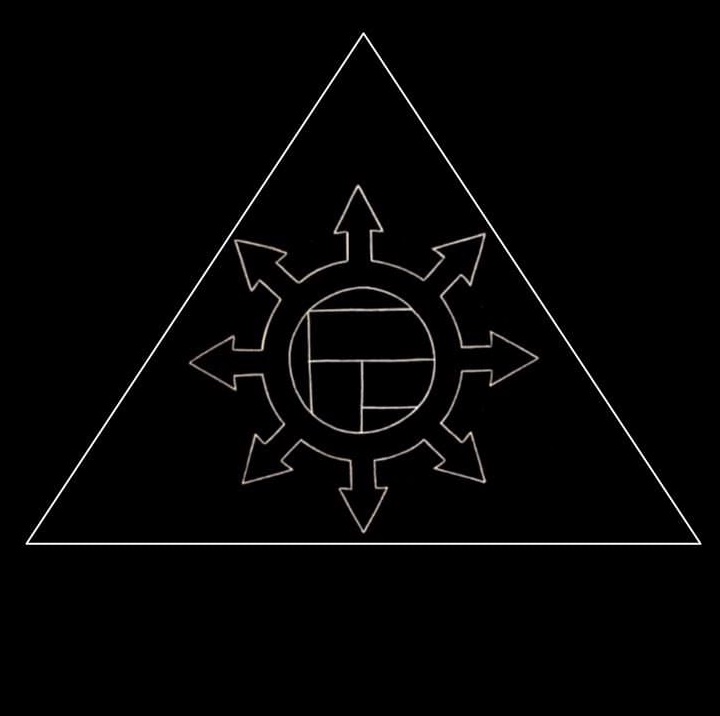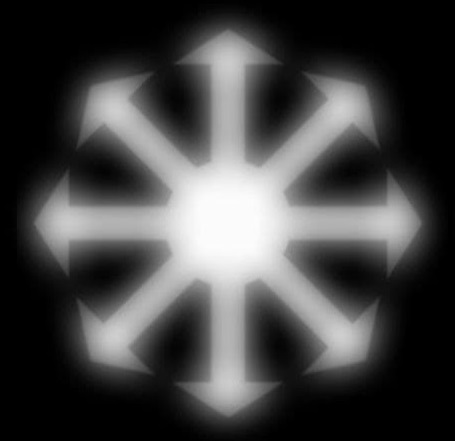by Frater Fuchs

Attempting to explain the essence of chaos magic in a concise manner is a challenging endeavor, as chaos magic is primarily distinguished by the absence of uniform descriptions, rigid rules, shared beliefs, or standardized rituals. It thrives as a dynamic and ever-evolving landscape, devoid of a singular explanation for the existence or functioning of magic itself among its practitioners. Nonetheless, certain key concepts, such as „paradigm shift,“ and the provocative axiom „Nothing is true, everything is permitted!“ are recurrent motifs within this enigmatic tradition.
This inherent fluidity sets chaos magic apart from all other belief systems, worldviews, religions, and magical schools around the globe. This very resistance to categorization and definition makes it extraordinarily difficult to articulate any general statements about chaos magic without provoking substantial disagreement from various chaos magicians. Consequently, I have chosen to forgo the attempt to provide a broad overview of chaos magic. Instead, I aim to share my personal, individual perspective on (chaos) magic and endeavor to illuminate this mysterious path as I perceive it.
When I observe any religious ceremony, ritual, or magical action, it is entirely impossible for me to discern from the outside what has been performed by a chaos magician and what has not. Whether it is a Catholic Mass, a Voodoo ceremony, a shamanic journey, a Hindu puja, a simple candle spell, or a complex ceremonial magic ritual, any of these could have been enacted by a chaos magician—or none of them. As previously mentioned, there are no “typical chaos magic” rituals, deities, or ceremonies that can be identified from the outside as belonging to chaos magic. Only through conversing with the practitioner about the motivations behind their actions can I ascertain whether they are a chaos magician. I would inquire: Why this color of candles? Why this spell? Why this prayer, this gesture, this dance? Why these rules? What significance does this chalice, this wand, this intricately designed robe hold? How does this ritual function according to your understanding?
A devout Christian might tell me that the Bible proclaims the truth, that prayers are heard by God, and that the crucifix is a sacred symbol of their deity who sent His son to Earth in human form. They might believe that this almighty God can and sometimes does perform miracles in response to sincere prayer. Their religious actions are exclusively directed towards this God, who alone can perform true miracles, while humans are mere supplicants. Regarding their rituals, they would likely tell me that these stem from ancient traditions, deriving their legitimacy and power from this long-standing heritage.
In contrast, a chaos magician would likely respond that they do what they have found to be effective, regardless of whether it was prescribed by a deity or created by themselves. It does not matter if it seems disconnected, absurd, or purposeless from the outside. The sole criterion is its utility. It does not even matter if it is absolutely and forever true. Truth, within the realm of chaos magic, is highly flexible, individual, and relative.
Many who encounter the term „chaos magic“ for the first time mistakenly perceive it as a magical technique, a specific method, or a form of disorderly magic. This is a significant misconception. Chaos magic is not a technique or a particular magical method. It is a philosophy, a lens through which magic is viewed, a meta-paradigm, if you will.
To me, all the various magical techniques are „just“ tools that help us believe in the reality of magic. This belief, this expectation, seems to be what generates the effect, not the tools or the methods themselves. Many magicians I’ve discussed this with are not particularly interested in why magic works. I, however, am innately curious and question everything. It is not enough for me to know that magic exists and works; I want to understand why. This is precisely where chaos magic leaves a gap.
In the eyes of chaos magicians, paradigms are interchangeable, selected based on personal preference and effectiveness. However, a crucial detail often overlooked when discussing the paradigm shift is that we always believe in something. Even when we recognize that beliefs and worldviews are interchangeable like light bulbs, we still adhere to some belief.
The same event, observed by two individuals simultaneously, can be interpreted in vastly different ways. Not only are paradigms individually unique, but so is the perception of reality itself, with each influencing the other. Every perceiving being interprets their experiences and draws conclusions, which are likely incomplete, as our individual perceptions and conclusions will never capture the full picture or recognize all the connections.
If we were constantly aware that nothing we believe or perceive is universally or eternally true, we would struggle to hold onto anything. Everything would dissolve into a whirlpool of relativity. Participating in everyday life would become exceedingly difficult if we questioned fundamental beliefs like gravity or the need for air to breathe. As everyday reality becomes more relative, we become more transcendent, less able to understand the lives of those grounded in common paradigms. This could lead to losing our minds rather than finding enlightenment.
Thus, even if I understand that worldviews and paradigms are mere windows through which I view the world, and that absolute truths may not exist, I still believe in something:
What if the reason we cannot fly is not the existence of gravity, but our lack of belief in overcoming it? I believe that all spells, magical daggers, wands, chalices, robes, candles, ceremonies, and rituals serve as necessary distractions. They are toys we use to convince ourselves that we need them because we cannot accept that none of these are essential for magic to work. The gods we invoke are but masks, ideas we need until we realize that we are the gods, and that we possess all the power.
There is an Ouranobarbaric word, “IJACEEBO,” which translates to: “All the gods and demons are we!” Contemplating this long enough, I eventually understand my fear of being God, my fear of performing the impossible, like overcoming gravity. It is daunting because omnipotence entails total responsibility, and this seems overwhelming for someone like me, who knows and understands so little.
And it is not merely the weight of responsibility that is scary: We could all embody the essence of Jesus, a deity in human guise, capable of performing miracles. Theoretically, anyone can achieve this state of cosmic consciousness. Yet, in contemporary Western society, the mere contemplation of such a possibility is often taboo, a notion of fraught with the implicit, if not overt, fear of being deemed insane and subsequently ostracized or institutionalized.
Thus, it is far simpler to remain ensconced in the comforting illusion of being „just“ a magician rather than embracing the overwhelming reality of an omnipotent being temporarily inhabiting a human form.
But possibly, there are no absolute truths.
